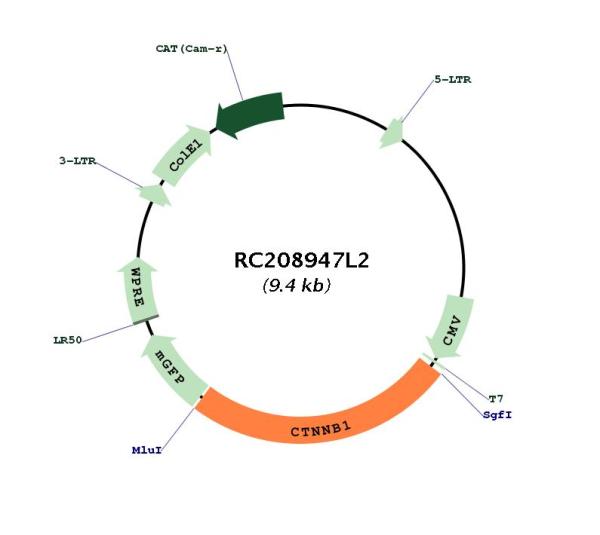beta Catenin (CTNNB1) (NM_001904) Human Tagged Lenti ORF Clone
CAT#: RC208947L2
- LentiORF®
Lenti ORF clone of Human catenin (cadherin-associated protein), beta 1, 88kDa (CTNNB1), transcript variant 1, mGFP tagged
"NM_001904" in other vectors (6)
USD 365.00
Specifications
| Product Data | |
| Type | Human Tagged ORF Clone |
| Tag | mGFP |
| Symbol | beta Catenin |
| Synonyms | armadillo; CTNNB; EVR7; MRD19; NEDSDV |
| Vector | pLenti-C-mGFP |
| E. coli Selection | Chloramphenicol (34 ug/mL) |
| Mammalian Cell Selection | None |
| Sequence Data |
The ORF insert of this clone is exactly the same as(RC208947).
|
| Restriction Sites |
SgfI-MluI
Cloning Scheme for this gene
Plasmid Map

|
| ACCN | NM_001904 |
| ORF Size | 2343 bp |
| OTI Disclaimer | Due to the inherent nature of this plasmid, standard methods to replicate additional amounts of DNA in E. coli are highly likely to result in mutations and/or rearrangements. Therefore, OriGene does not guarantee the capability to replicate this plasmid DNA. Additional amounts of DNA can be purchased from OriGene with batch-specific, full-sequence verification at a reduced cost. Please contact our customer care team at custsupport@origene.com or by calling 301.340.3188 option 3 for pricing and delivery. The molecular sequence of this clone aligns with the gene accession number as a point of reference only. However, individual transcript sequences of the same gene can differ through naturally occurring variations (e.g. polymorphisms), each with its own valid existence. This clone is substantially in agreement with the reference, but a complete review of all prevailing variants is recommended prior to use. More info |
| OTI Annotation | This clone was engineered to express the complete ORF with an expression tag. Expression varies depending on the nature of the gene. |
| Product Components | The ORF clone is ion-exchange column purified and shipped in a 2D barcoded Matrix tube containing 10ug of transfection-ready, dried plasmid DNA (reconstitute with 100 ul of water). |
| Reconstitution | 1. Centrifuge at 5,000xg for 5min. 2. Carefully open the tube and add 100ul of sterile water to dissolve the DNA. 3. Close the tube and incubate for 10 minutes at room temperature. 4. Briefly vortex the tube and then do a quick spin (less than 5000xg) to concentrate the liquid at the bottom. 5. Store the suspended plasmid at -20°C. The DNA is stable for at least one year from date of shipping when stored at -20°C. |
| Reference Data | |
| RefSeq | NM_001904.2 |
| RefSeq Size | 3697 bp |
| RefSeq ORF | 2346 bp |
| Locus ID | 1499 |
| UniProt ID | P35222 |
| Cytogenetics | 3p22.1 |
| Domains | Armadillo_seg |
| Protein Families | Druggable Genome, ES Cell Differentiation/IPS, Transcription Factors |
| Protein Pathways | Adherens junction, Arrhythmogenic right ventricular cardiomyopathy (ARVC), Basal cell carcinoma, Colorectal cancer, Endometrial cancer, Focal adhesion, Leukocyte transendothelial migration, Melanogenesis, Pathogenic Escherichia coli infection, Pathways in cancer, Prostate cancer, Thyroid cancer, Tight junction, Wnt signaling pathway |
| MW | 85.3 kDa |
| Gene Summary | The protein encoded by this gene is part of a complex of proteins that constitute adherens junctions (AJs). AJs are necessary for the creation and maintenance of epithelial cell layers by regulating cell growth and adhesion between cells. The encoded protein also anchors the actin cytoskeleton and may be responsible for transmitting the contact inhibition signal that causes cells to stop dividing once the epithelial sheet is complete. Finally, this protein binds to the product of the APC gene, which is mutated in adenomatous polyposis of the colon. Mutations in this gene are a cause of colorectal cancer (CRC), pilomatrixoma (PTR), medulloblastoma (MDB), and ovarian cancer. Alternative splicing results in multiple transcript variants. [provided by RefSeq, Aug 2016] |
Documents
| Product Manuals |
| FAQs |
| SDS |
Resources
Other Versions
| SKU | Description | Size | Price |
|---|---|---|---|
| RC208947 | CTNNB1 (Myc-DDK-tagged)-Human catenin (cadherin-associated protein), beta 1, 88kDa (CTNNB1), transcript variant 1 |
USD 1,072.00 |
|
| RC208947L1 | Lenti ORF clone of Human catenin (cadherin-associated protein), beta 1, 88kDa (CTNNB1), transcript variant 1, Myc-DDK-tagged |
USD 1,372.00 |
|
| RC208947L3 | Lenti ORF clone of Human catenin (cadherin-associated protein), beta 1, 88kDa (CTNNB1), transcript variant 1, Myc-DDK-tagged |
USD 1,372.00 |
|
| RC208947L4 | Lenti ORF clone of Human catenin (cadherin-associated protein), beta 1, 88kDa (CTNNB1), transcript variant 1, mGFP tagged |
USD 1,372.00 |
|
| RG208947 | CTNNB1 (tGFP-tagged) - Human catenin (cadherin-associated protein), beta 1, 88kDa (CTNNB1), transcript variant 1 |
USD 1,272.00 |
|
| SC107921 | CTNNB1 (untagged)-Human catenin (cadherin-associated protein), beta 1, 88kDa (CTNNB1), transcript variant 1 |
USD 450.00 |
{0} Product Review(s)
Be the first one to submit a review






























































































































































































































































 Germany
Germany
 Japan
Japan
 United Kingdom
United Kingdom
 China
China


